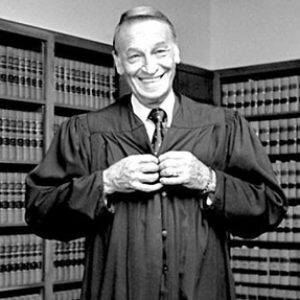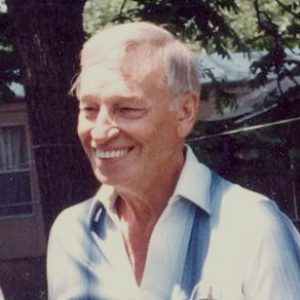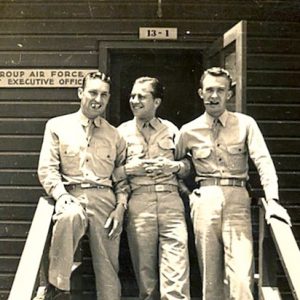calsfoundation@cals.org
Harry Eugene Claiborne (1917–2004)
Harry Eugene Claiborne, a native of McRae (White County), was a lawyer, politician, and later a federal judge in Las Vegas, Nevada. Claiborne became known nationwide in 1986 as the first sitting federal judge to be sent to prison and the fifth person in American history to be removed from his or her position through impeachment by the U.S. Senate.
Harry Claiborne was born on July 2, 1917, in the Lebanon community just outside McRae. His father, Arthur Smith Claiborne Jr., was a cotton farmer, and his mother, Minnie King Claiborne, was a schoolteacher. Early on, Claiborne gained a reputation in McRae for his speaking ability, and he would often accompany his grandfather to view court proceedings at the White County Courthouse in nearby Searcy.
Claiborne graduated from McRae High School in 1932 and attended college for a couple of years at Ouachita Baptist College (now Ouachita Baptist University) in Arkadelphia (Clark County).
Claiborne was determined to attend law school at Louisiana State University (LSU), and he hitchhiked to Baton Rouge, Louisiana, seeking admission. At that time, only two years of college were required for admittance to law school. Claiborne was refused admission to LSU and began hitchhiking back home to Arkansas. During this trip, he caught a ride with a salesman named Schneider, who told Claiborne that he was childhood friends with Judge Albert B. Neil, the chief justice of the Tennessee Supreme Court. When they parted, he gave Claiborne a letter of introduction.
After visiting Neil, he was granted admission to Cumberland School of Law, then part of Howard College in Tennessee. He graduated from Cumberland in June 1941 and returned to Arkansas, where he was a clerk in the Coulter Law Firm of Little Rock (Pulaski County).
Early in 1942, Claiborne was admitted to the Arkansas state bar, but as World War II had just begun, he enlisted in the U.S. Army and was sent to the Santa Ana Army Air Base. He served in the military police force, rounding up Japanese Americans for internment. By 1943, Claiborne was promoted to warrant officer and transferred to what is now Nellis Air Force Base near Las Vegas. His job was to investigate AWOL (absent without leave) incidents. Later, he guarded prisoners and supervised the military police who patrolled downtown Las Vegas. He was briefly stationed in New Mexico and then Massachusetts.
Claiborne was issued a train ticket home to Arkansas in 1945, but he instead paid the difference for a ticket to Las Vegas, where, within twenty-four hours of arriving, he got a job as a patrolman for the Las Vegas Police Department. By 1947, Claiborne had been admitted to the Nevada state bar and was working in the Clark County District Attorney’s office. He subsequently was the chief deputy district attorney for Clark County (1946–1948) and served as a state assemblyman in 1948; that same year, he also served as city attorney for North Las Vegas. In 1964, Claiborne ran against Howard Cannon for the U.S. Senate but was not elected.
Claiborne quickly gained a reputation as the “go-to lawyer” in Las Vegas, known for his “spell-binding closing arguments and country boy style.” One trick he employed to intimidate his opposition was to carry in large stacks of papers he passed off as evidence in the case; often, the papers in those folders were blank. Claiborne represented a number of celebrities, including Frank Sinatra, Dean Martin, and Judy Garland, and was also known for representing mobsters such as Bugsy Siegel and Frank “Lefty” Rosenthal. He also represented Giuseppe “Joe” Conforte, the owner of the Mustang Ranch Brothel, and Benny Binion, owner of the Horseshoe Casino.
In 1978, Claiborne was recommended for the federal judgeship for the U.S. District Court, District of Nevada, by his former senatorial opponent, Senator Cannon, and was then nominated by President Jimmy Carter to fill the seat. Claiborne was confirmed as a federal judge in August 1978.
Claiborne was unique as a federal judge, given that most federal judges had experience as assistant U.S. attorneys. His appointment raised concern within the U.S. Department of Justice because of his close friendship with casino owner and convicted murderer Binion; the two men ate lunch together almost daily. Also, Claiborne was known for cashing large checks at local casinos and had a reputation for liking whiskey and flashy women. Claiborne became a particular target of Joseph Yablonsky, who was, in 1980, the head of the Federal Bureau of Investigation (FBI) office in Las Vegas. After failing for two years to collect sufficient evidence that Claiborne was involved in a wire-tapping scheme, Yablonsky was contacted by representatives for Claiborne’s former client and notorious brothel owner Joe Conforte. They claimed that Claiborne had bribed him for $30,000 to delay a subpoena against two of Conforte’s prostitutes in a voter fraud case. He also claimed that Claiborne had requested an additional bribe of $100,000 for fixing Conforte’s appeal for a conviction for income tax evasion. Ultimately, Claiborne was brought to trial for these charges but was acquitted. In the meantime, Claiborne had become the chief judge of the U.S. District Court, District of Nevada.
However, the FBI next found evidence through the Internal Revenue Service (IRS) that Claiborne had failed to report a total of almost $100,000 in income for 1979 and 1980. Claiborne claimed it was an error in bookkeeping. In 1984, he was convicted of income tax evasion and sentenced to the federal penitentiary in Montgomery, Alabama.
In June 1986, the House Judiciary Committee received a House resolution to seek Claiborne’s impeachment, and on July 22, 1986, the House voted 406 to 0 to impeach. There were four articles of impeachment: Article I, for filing false income tax returns for 1979; Article II, for filing false income tax returns in 1980; Article III, stating that Claiborne should be removed from the bench solely for having been convicted in 1984; and Article IV, for betraying the trust of the people and bringing disrepute on the federal judiciary. Claiborne became the fourteenth federal official to be impeached by the House.
In early August, the House presented the four articles to the Senate and set up a timetable and procedures, which set a new precedent of using a special twelve-member committee (including Senator David Pryor of Arkansas) to collect evidence, rather than the full Senate. Testimony began in September 1986 in the Russell Office Caucus Room, famous for the Watergate hearings of 1974. On October 9, 1986, Claiborne was convicted on three of the four articles, and his service as a judge was terminated due to his impeachment and conviction. (He was acquitted on Article III because it was feared that Article III would set a precedent for conviction in another court being an automatic impeachment.) Claiborne was the fifth person ever to be removed from a position through the Senate’s impeachment process.
Claiborne spent seventeen months of a two-year sentence at the federal penitentiary in Montgomery and then returned to Las Vegas, where the state bar attempted to disbar him in 1987. Claiborne sued. The Nevada Supreme Court ruled that Claiborne could practice law in Nevada, and Claiborne was reinstated to the bar, though he was barred from practicing law in federal court.
In 1990, Claiborne was diagnosed with prostate cancer. He then suffered a heart attack in 1991. His last jury trial was in 1993. In an interview with the Las Vegas Sun in 1996, Claiborne said he was not bitter about the impeachment and believed his name would eventually be cleared.
On January 19, 2004, Claiborne took his own life. His cancer had returned, and he had recently been diagnosed with Alzheimer’s. He was survived by his third wife, Norma Ries Claiborne, and three daughters.
For additional information:
Alverson, J. Bruce. Flamboyant Lawyer in a Maverick Western Town: Las Vegas through the Eyes of Harry Claiborne. N.p.: J. Bruce Alverson, 2011.
“Harry Claiborne, 86, Is Dead; Was Removed as U. S. Judge.” New York Times, January 22, 2004, p. 15C.
“The Impeachment of Harry E. Claiborne, 1986.” http://www.senate.gov/artandhistory/history/common/briefing/Impeachment_Claiborne.htm (accessed November 23, 2020).
Koch, Ed, and Jeff German. “Former U.S. Judge Claiborne Dies at 86.” Las Vegas Sun, January 20, 2004.
Vernetti, Michael. Lies within Lies: The Betrayal of Nevada Judge Harry Claiborne. Las Vegas: Stephens Press, 2011.
Mary Alice Chambers
North Little Rock, Arkansas
 Divergent Prosperity and the Arc of Reform, 1968–2022
Divergent Prosperity and the Arc of Reform, 1968–2022 Law
Law Harry Claiborne
Harry Claiborne  Harry Claiborne
Harry Claiborne  Harry Claiborne: WWII
Harry Claiborne: WWII 



Harry Claiborne was my grandpa, but I always considered him to be my father because he raised me. He was my favorite person in this entire world. I visited his hometown McRae a couple times, and I loved it! We stayed at his childhood home. He loved going back to see his home and friends and family he hadn’t seen in a long time. My grandpa treated everyone the same regardless of race or creed. He was admired by all in Las Vegas. Everywhere we went people just wanted to shake his hand because what the F.B.I. did to him was wrong! As a kid I didn’t know he went to jail. I was told he was going fishing; even when I visited him in jail I was led to believe he was fishing. Yoblonski was corrupt and even lost his job due to that fact. He had it out for my grandpa and got frustrated when his attempts to get him removed didn’t work. So that’s when he went to the snake Conforte, who was exiled from America, and offered him a deal to come testify against my grandpa, whom he represented when he was an attorney and helped! He came to testify against my grandpa with lies that were blatant and proved to be so in court. I will not get into details, but Yoblonski was so mad he couldn’t find anything against my grandpa that he even went to lengths to end his life and mine as well. I miss my grandpa every single day. I will never forget the night he passed. All I heard was the shot. I knew what happened. I walked into his office at home five minutes prior and he looked at me and didn’t know who I was. He then remembered and felt so bad. I asked him what he was doing up, and he told me he was going to go to sleep. I just had no idea that is what he meant. He was in a lot of pain. I recently had twin boys and named them both after him.